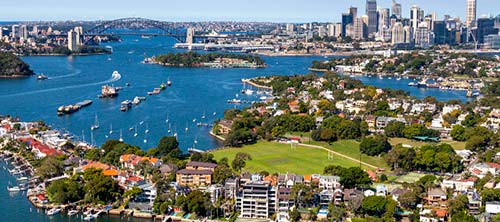New car sales in the country are dropping, although the most recent electric car statistics in Australia show impressive sales, which were up by over 200 per cent in 2019.
The reduction in the rate of new car sales reflects people’s changing perceptions of vehicle ownership and its contribution to the climate crisis.
Group CEO and Chairman of Volkswagen, Herbert Diess, was quoted in April by The Economist as saying, “…ownership is not necessarily what you want. You want a car when you need a car.” Many of the larger car producers offer similar sentiments.
Meanwhile, the growing popularity of electric cars and other eco-friendly modes of transport in Australia brings to focus people’s desire to practise sustainable living.
News in June reported NSW will provide $3,000 rebates and slash stamp duty for electric vehicles. So get ready to see electric vehicles on the Balmain Peninsula
Transportation in the Balmain Peninsula
We’re lucky on the Balmain Peninsula, with three primary modes of transport: car, ferry, and bus. As well, many locals are keen cyclists, especially for short trips to and from the city.
While our personal cars represent more than mobility, Millennials, in particular, are more likely to forgo the purchase of a car and instead opt for car sharing, cycling or public transport. However, we envisage many changes coming to Balmain and the Inner West, especially around the rise of the use of electric vehicles.
Changes on the Balmain Peninsula with EVs
- Infrastructure supporting electric car ownership, such as EV (electric vehicle) charging stations in apartment blocks and shopping centres.
- Increased use of GoGet (quite a few in Balmain), Zipcar or other car-sharing company vehicles.
- Lower car ownership and use in those inner-city suburbs with good public transport options.
- Car owners ditching cars altogether due to the expense of car ownership versus taking an Uber or using a share service like GoGet and Zipcar, which offer different vehicle types, including utes, luxury cars and minivans.
- Fewer cars overall, although the pandemic did force many people back to driving their own cars due to health and safety concerns over the use of public transport.
For Millennial residents of the Balmain Peninsula (and everywhere else), these could be welcome changes, especially since their generation has always been more focused on the journey and the environmental impact of their transport choices.
Changing attitudes to cars in the Inner West
We know how much fuel it takes to run one car and how this need keeps fossil fuels on the market and the industry going. The impact of conventional transport on the level of carbon emissions is already common knowledge.
Although the emotional benefits of car ownership like freedom, safety and independence remain, most people, especially younger people, now view cars as more of a means to an end rather than an expression of personality and style.
Individual car ownership is proving to be more expensive and not really worth it in the long run, especially when we consider that most cars are used for only 5% of the time.
And even though the use of electric cars may not be as widespread on the Balmain Peninsula due to practical and spatial concerns, the advent of change might mean more EVs (electric vehicles) but fewer vehicles overall.
Looking for help selling your home or renting your investment property? Our team at Belle Property Balmain support homeowners across Balmain, Balmain East, Birchgrove, Rozelle and Lilyfield. Feel free to get in touch for a no-obligation discussion or property appraisal.




